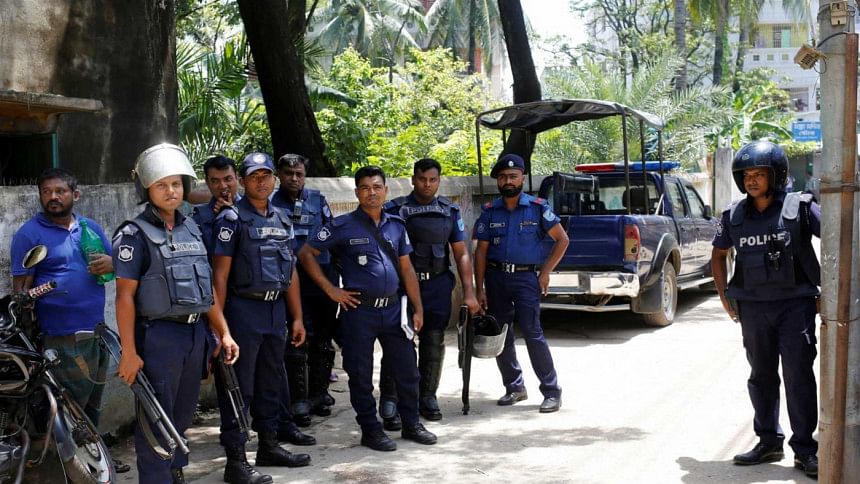Police recruitment must be fair and transparent

Recently, there have been news reports highlighting serious irregularities in the recruitment of constables in the district of Narayanganj. The Transparency International Bangladesh (TIB) has also alleged that there is reasonable suspicion of massive fraud and bribery in such recruitment processes, and termed the dereliction of statutory duties on the part of recruiters as unpardonable. The anti-graft body has rightly commented that lapses and negligence in the recruitment process cannot be solely attributed to the subordinate officials who did not properly fulfil their due responsibilities in carrying out the verification work—thereby facilitating the entry of improper personnel in the police department—and that the senior supervisory officials, including the district superintendent, as appointing authority cannot skirt their responsibility by placing all the blame on the subordinates. The Bangladesh Police Headquarters, thankfully, has taken appropriate action by cancelling the irregular appointments after conducting an enquiry.
From the media reports, it appears that the irregularities in the Narayanganj recruitment pertains to incorrect residency status. However, there are reports of other wrongdoings in such recruitment of constables. The main cause for concern here is the alleged corruption in the recruitment process resulting from the complicity of some officials as well as some external influence. The end result is the appointment of undesirable personnel that sooner or later adversely impacts law enforcement. As such, there is a cogent concern about public interest in such recruitment in a publicly funded organisation.
Speaking of such concerns, it needs to be highlighted that the police operate on those margins of society where civil liberties may be at risk, and where freedoms and rights may often have to be curtailed in the interest of maintaining peace and order. The constables in our system are legally empowered to curtail the liberty of any individual on the basis of reasonable suspicion. Therefore, there is a distinct possibility of citizens' liberty being at great risk if there is an intake of individuals in the police force through dishonest or dubious means. Simple common sense should tell us that a police constable appointed by means of bribery will hardly ever acquire a general consciousness of how important the concepts of democracy, justice, fundamental freedoms and human rights are. The most likely scenario would be one in which, because of their entry into the force, the general public will have reduced protection from arbitrary and improper interference with their liberties.
It is only proper that police officials in a democratic country understand the natural human aspirations for freedom from arbitrary power, for the exercise of civil liberties, and for the acquisition of human rights. Police, both individually and collectively, have a fundamental role in securing the goals of human rights legislation and practice. In a democratic dispensation, police stand at the point of balance: securing human rights on the one hand, and on the other hand, exercising their lawful powers to protect the people and their institutions.
But emerging from a tainted recruitment system, police personnel are likely to corrupt themselves and indulge in arbitrary conduct, including torture and inhuman or degrading treatment. We know very well that the police authority can be abused even in the so-called strong democracies. The question is whether police will become more the master or less the servant. The police can snuff out more freedom than it protects. Therefore, the main problem lies in the notion of control. There is a considerable amount of moral burden on conscientious police officials, whose actions to check pernicious practices of recruitment are of paramount importance to the preservation of human rights.
In creating the vital instrument of law enforcement, our society needs to be very careful. It has to ensure that the system created to protect them does not become the instrument of their bondage, and that the manner of its control and the nature of its work ensure that, in containing crime and disorder, it does not take away those basic freedoms enshrined in domestic as well as international laws and declarations. Police have to carry out their duties within the bounds of the law of the country, to which they themselves are subject as well.
The government has to ensure that those who are chosen to exercise the power and authority of police are carefully selected, based on their human qualities, properly trained to perform their duties in an ethically correct manner and, most importantly, are led and directed by leaders with high qualities of human excellence. Anything less than that will disrupt the balancing of human rights with adequate control of excessive human misbehaviour. Measures have to be available to maintain correct standards through regular imposition of disciplinary regulations.
Improperly chosen individuals mostly become a liability for the police department and for the general public as well. The undesirable elements find entry to positions that do not need them. Such recruits become reckless, desperate to recoup their "investments" at the earliest time possible without any qualms of conscience. Once in uniform, these recruits let the lure of lucre take its hold and don't hesitate to deviate from the norms. The priority, therefore, is to initiate a concentrated drive that would make it difficult for dishonest people to enter the force or remain in focal positions.
Muhammad Nurul Huda is a former IGP of Bangladesh Police.

 For all latest news, follow The Daily Star's Google News channel.
For all latest news, follow The Daily Star's Google News channel. 



Comments